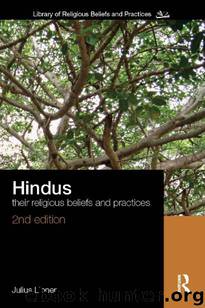Hindus: Their Religious Beliefs and Practices (The Library of Religious Beliefs and Practices) by Julius Lipner

Author:Julius Lipner [Lipner, Julius]
Language: eng
Format: epub, azw3
Publisher: Taylor and Francis
Published: 2012-10-02T04:30:00+00:00
Part II
For most religious Hindus, religious truth is ‘truth’ in a sense that does not deviate from the meaning of the word in everyday, secular usage. In other words, when the Gauḍīya Vaiṣṇava, for example, affirms that it is true that the Lord Kṛṣṇa assumed human form, that the Bhagavad Gītas analysis of the human condition is true, that it is true that Kṛṣṇa indwells his consecrated temple-image, s/he is using the word ‘true’ with the same sense of certitude with which people use ‘true’ for ordinary, empirical judgments. One often comes across the view – and it is not uncommon among Western-educated Hindus today – that religiously Hindus advocate a relativist sense of ‘truth’ where religious belief is concerned in the context of a ‘believe-what-you-want-and-let- others-do-the-same’ mentality. One can generalize this view as follows: ‘Do not argue over religious belief – which religion describes the true God and which does not, which faith shows the right way to salvation, and which leads people astray. How can you tell when it comes to transcendental matters? It is important rather to believe and act sincerely. Religious teachings are relative, and it is a mistake to take doctrine too seriously. This leads to strife. Does it matter whether Jesus existed or not, whether he was the “Son of God” or not? What matters is the fine moral teaching enshrined in the Gospels’, and so on. This view is then supposed to demonstrate the Hindu commitment to religious tolerance.
But the weight of history shows otherwise. Historically, Hindus have tended not to defend this view, and it does no justice to the sustained, often bitter doctrinal controversies that have been waged down the centuries not only among Hindus themselves but also between ‘Hindus’ (Advaitins, Śrī Vaiṣṇavas, Naiyāyikas etc.) and non-Hindus, such as the Jains and Buddhists. Discerning the truth matters. Here is how the Śrī Vaiṣṇava theologian, Rāmānjua, characterizes the Advaitic position that he vigorously opposed:
This view has been fabricated, through deceit and various inadmissible, bad arguments, by those who lack the specific virtues that occasion the blessing of the Supreme Person of the Upaniṣads. Their whole minds have been vitiated by a residue of beginningless sin, so that the nature of words and sentences and their proper meaning as also the ways of correct reasoning which prescribe what one must do, derived from sources of knowledge like perception etc., are unknown to them. As such, this view is to be scorned by those who know the truth (yāthātmyavid) through the proper sources of knowledge and [scriptural] utterance ascertained by sound reasoning.5
Not much tolerance here! There are many similar indictments of opposing views by other thinkers in their quest for religious truth.
For many Hindus, the pursuit of truth, especially religious truth, is regarded as an existential matter, that is, as a matter in which the integrity of the whole person is involved. No doubt, there is an ‘objective’ propositional element at stake, ifby proposition one refers to the ‘given’ content of a statement. Either
Download
Hindus: Their Religious Beliefs and Practices (The Library of Religious Beliefs and Practices) by Julius Lipner.azw3
This site does not store any files on its server. We only index and link to content provided by other sites. Please contact the content providers to delete copyright contents if any and email us, we'll remove relevant links or contents immediately.
Fingersmith by Sarah Waters(2532)
Kundalini by Gopi Krishna(2180)
Wheels of Life by Anodea Judith(2144)
Indian Mythology by Devdutt Pattanaik(1936)
The Bhagavad Gita by Bibek Debroy(1929)
The Yoga of Jesus: Understanding the Hidden Teachings of the Gospels by Paramahansa Yogananda(1848)
Autobiography of a Yogi (Complete Edition) by Yogananda Paramahansa(1823)
The Man from the Egg by Sudha Murty(1808)
The Book of Secrets: 112 Meditations to Discover the Mystery Within by Osho(1663)
Chakra Mantra Magick by Kadmon Baal(1638)
The Sparsholt Affair by Alan Hollinghurst(1585)
Sparks of Divinity by B. K. S. Iyengar(1531)
Gandhi by Ramachandra Guha(1528)
Avatar of Night by Tal Brooke(1519)
Karma-Yoga and Bhakti-Yoga by Swami Vivekananda(1491)
The Bhagavad Gita (Classics of Indian Spirituality) by Eknath Easwaran(1478)
The Spiritual Teaching of Ramana Maharshi by Ramana Maharshi(1428)
Hindoo Holiday by J. R. Ackerley(1376)
Hinduism: A Very Short Introduction (Very Short Introductions) by Knott Kim(1373)
